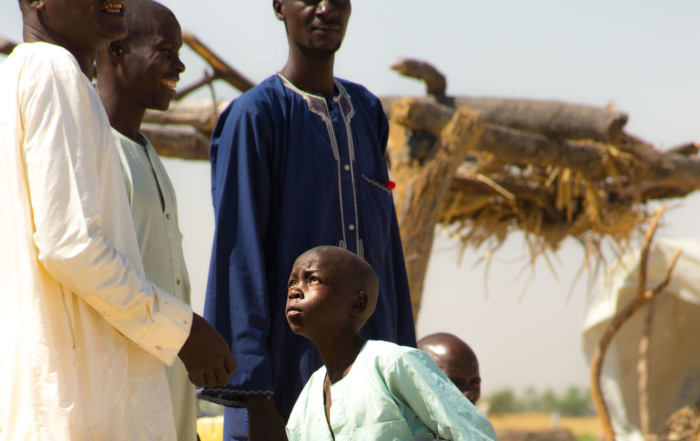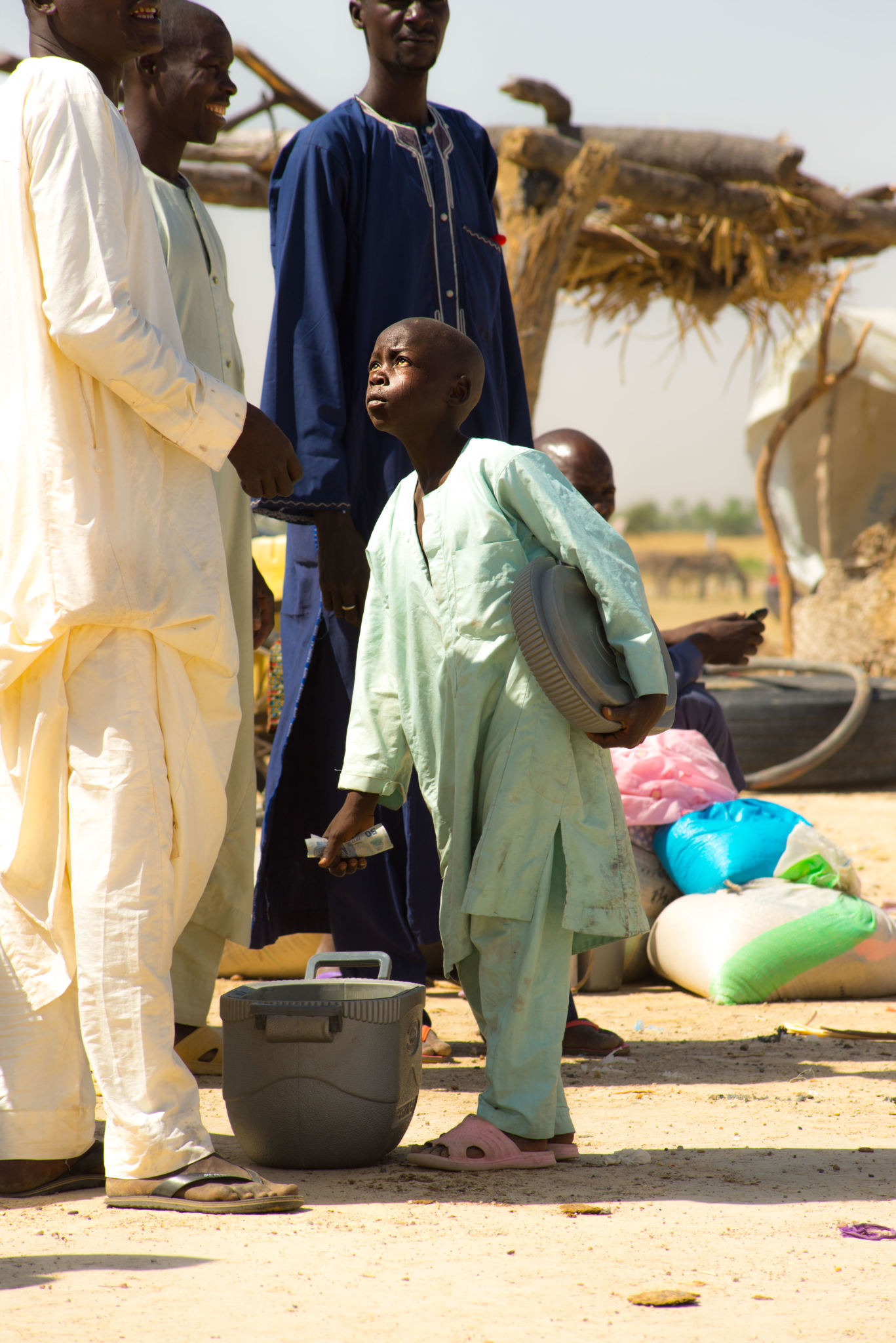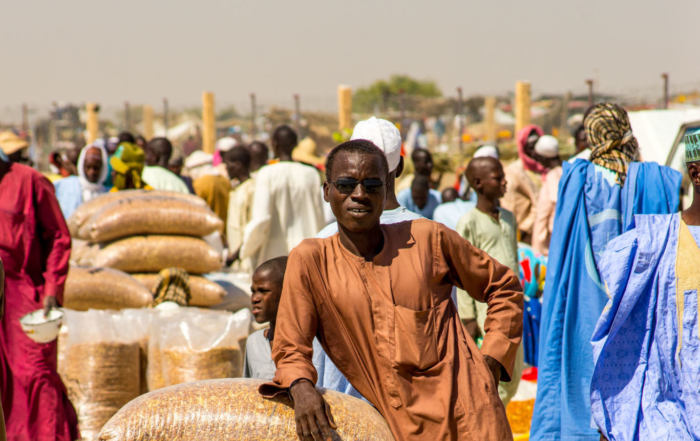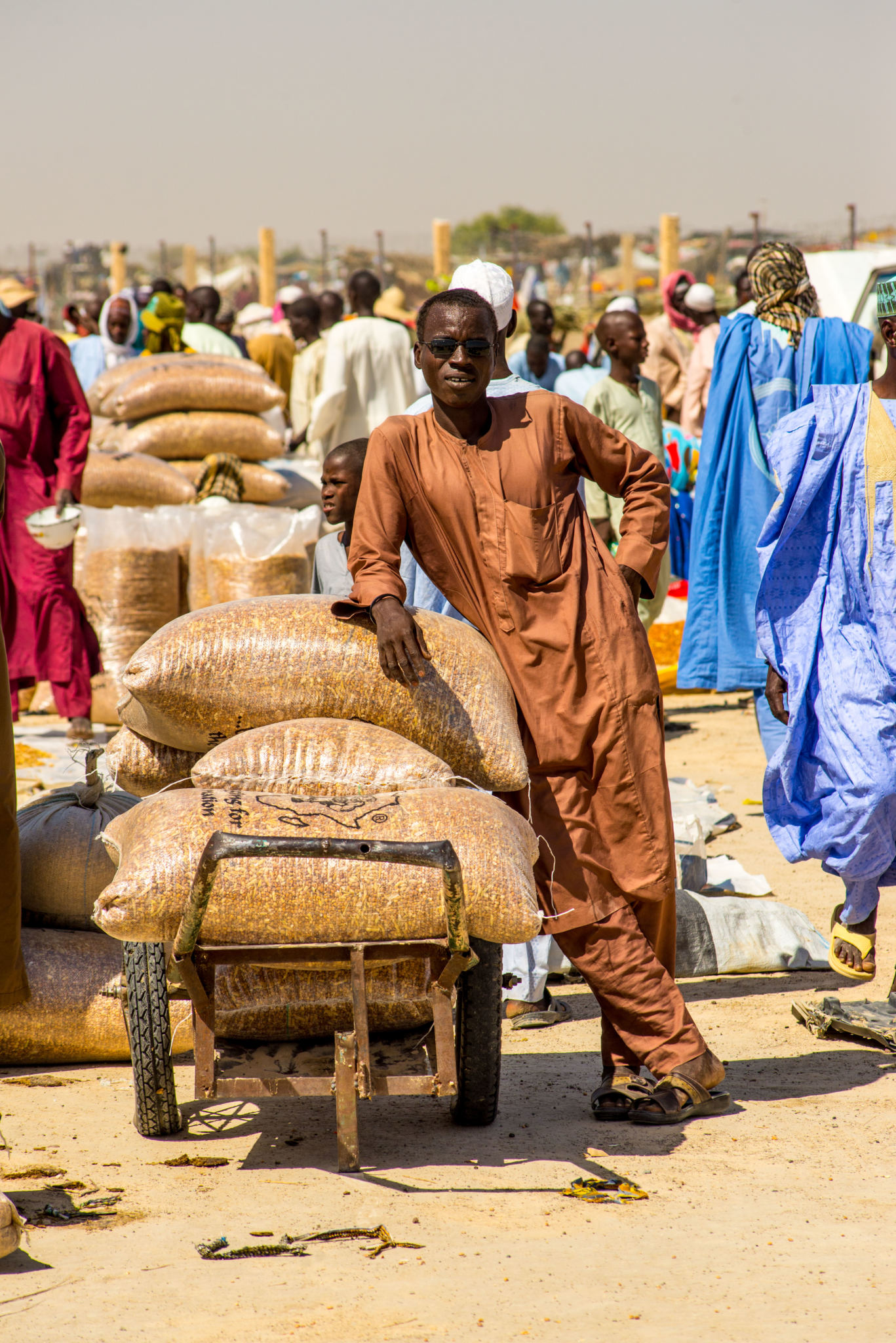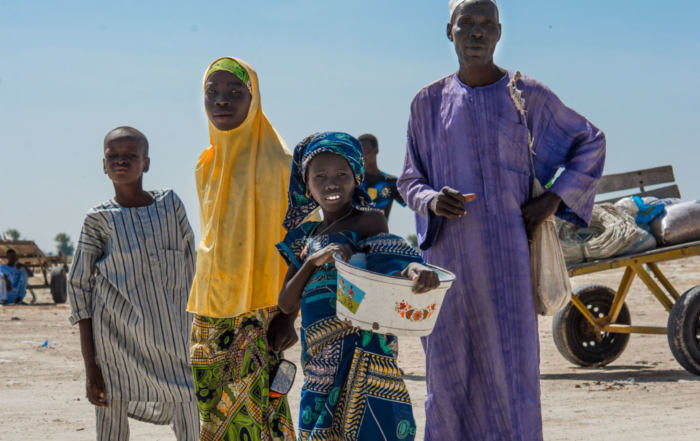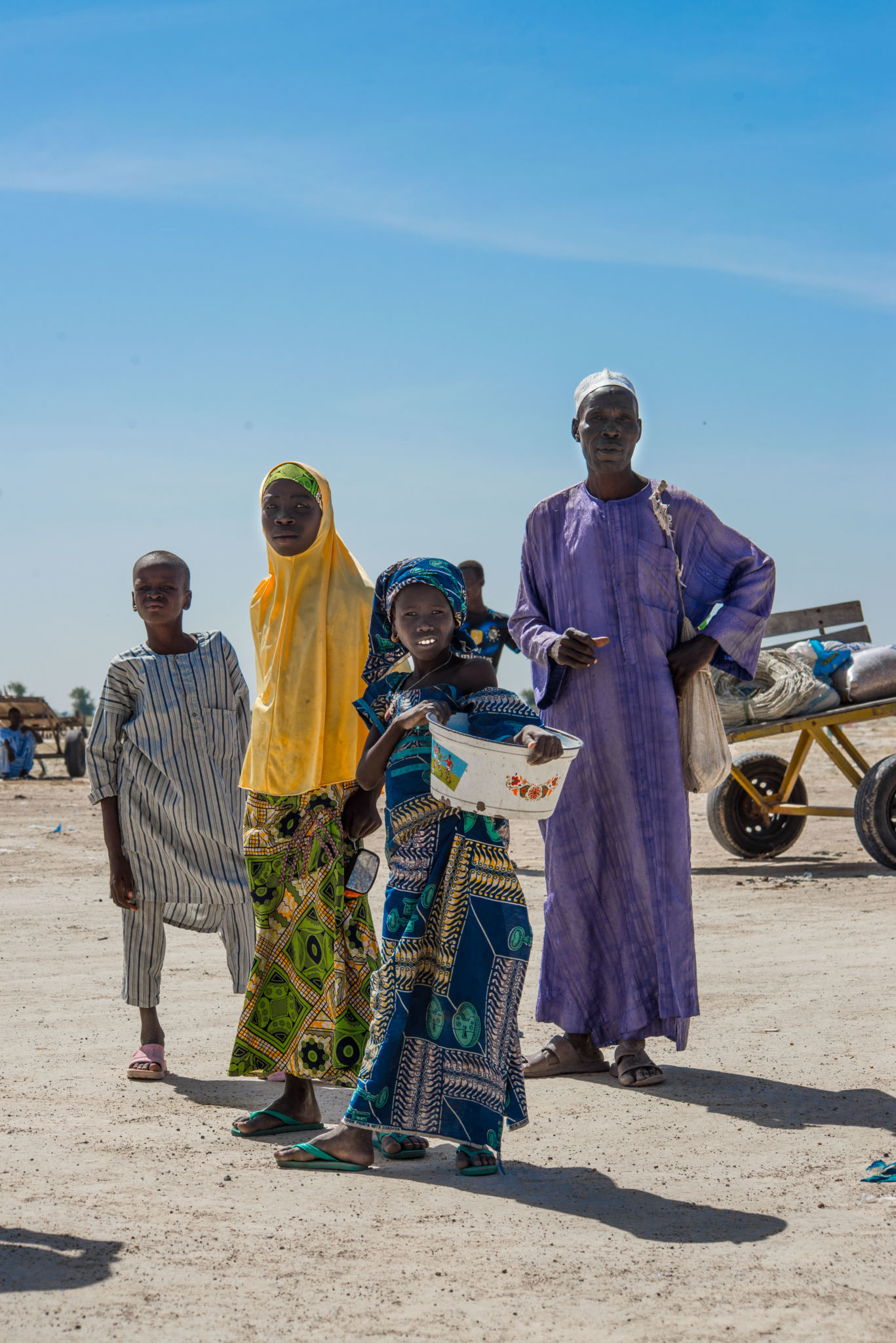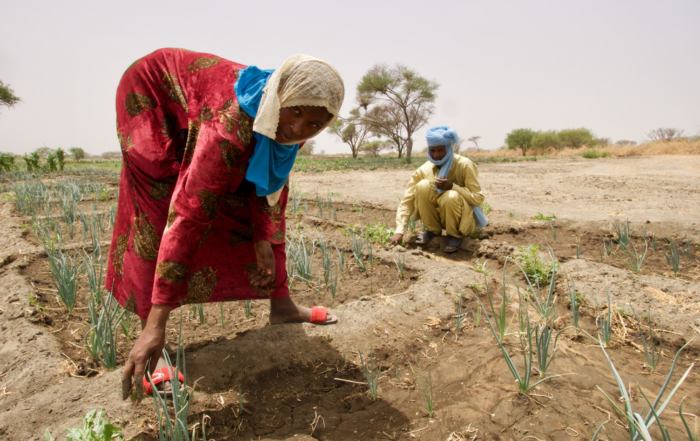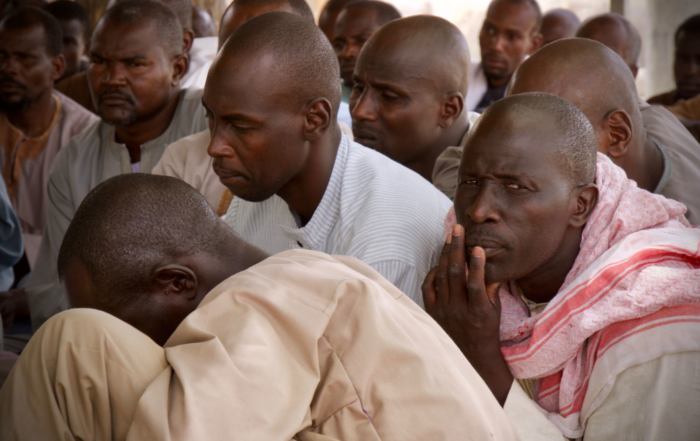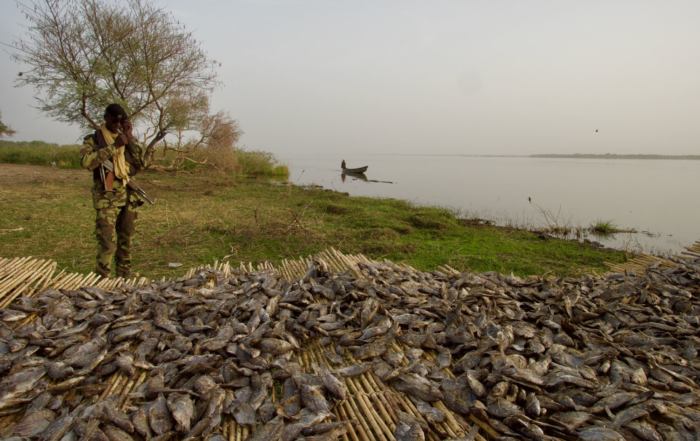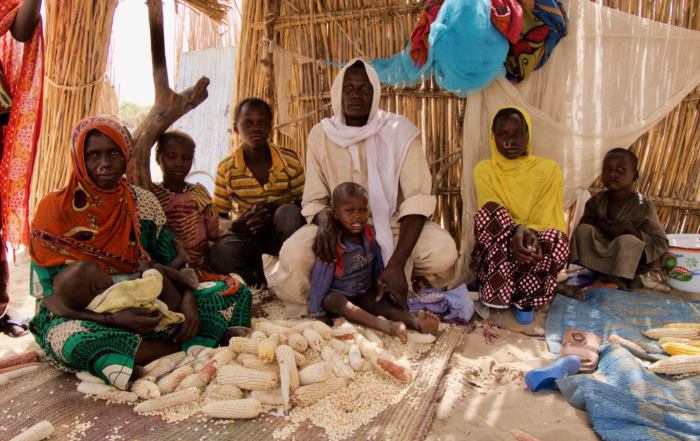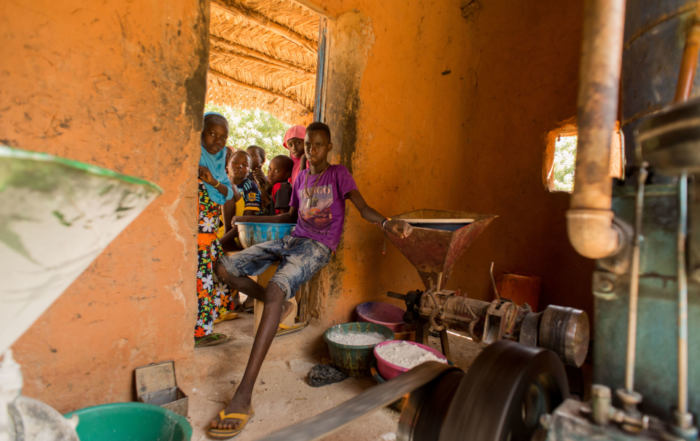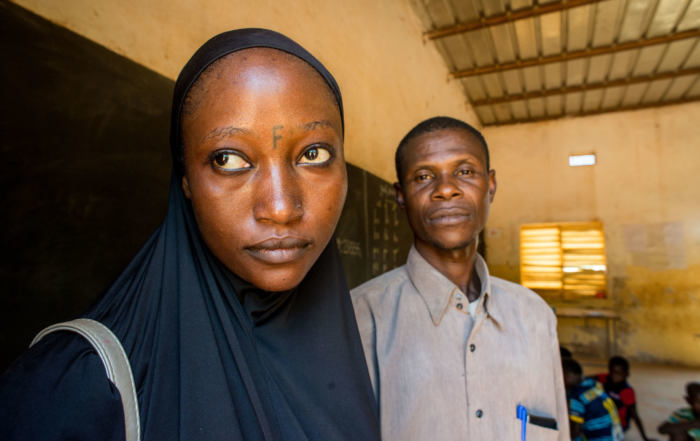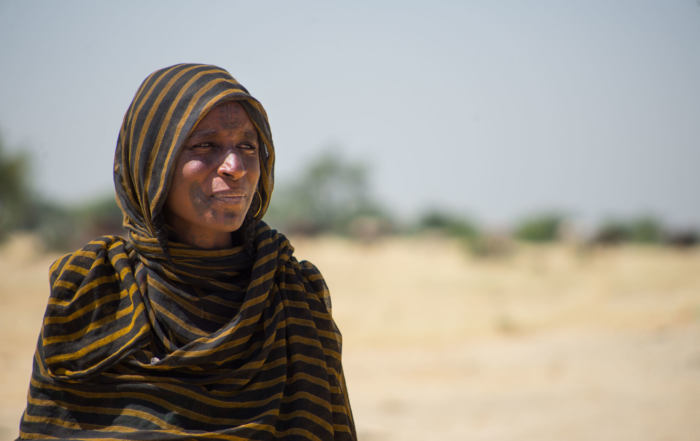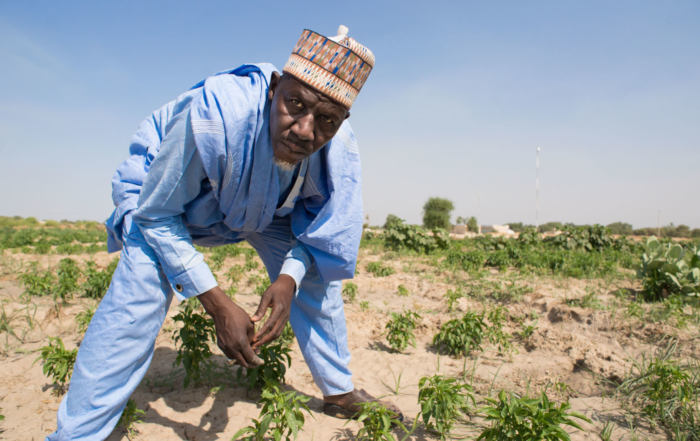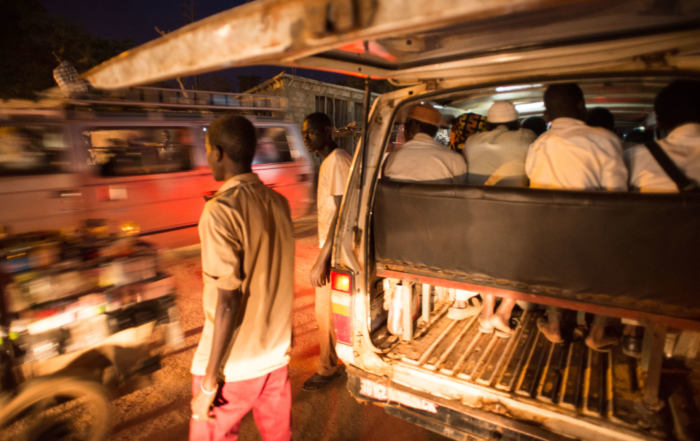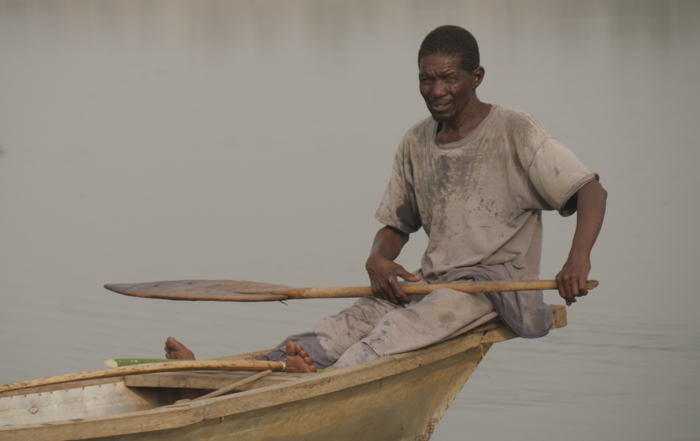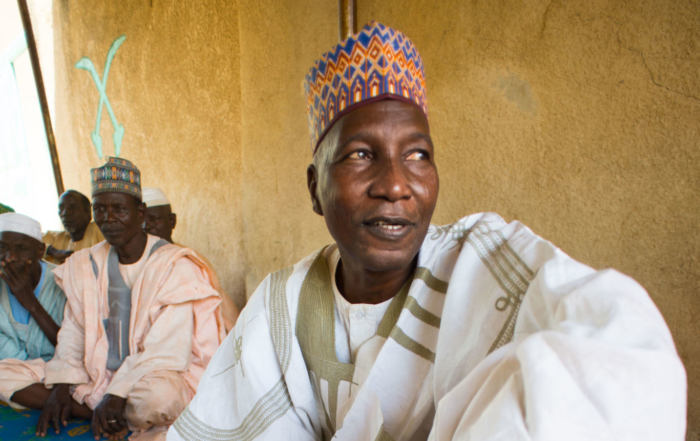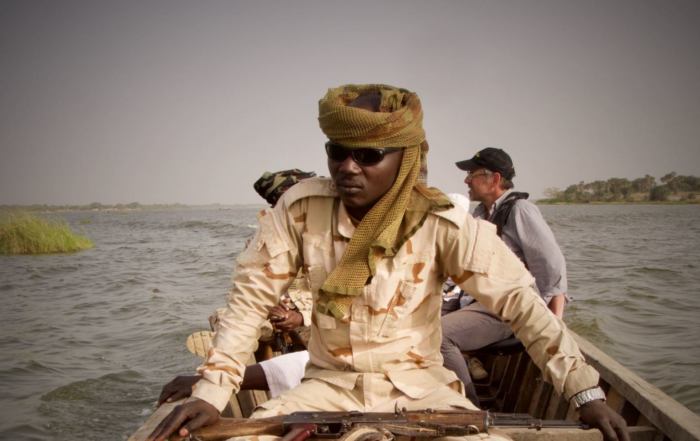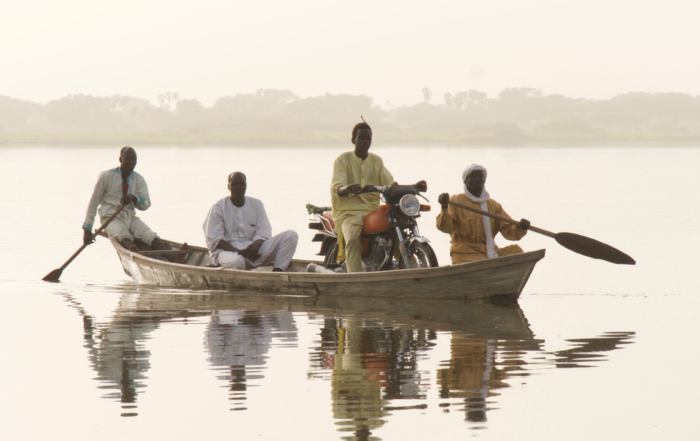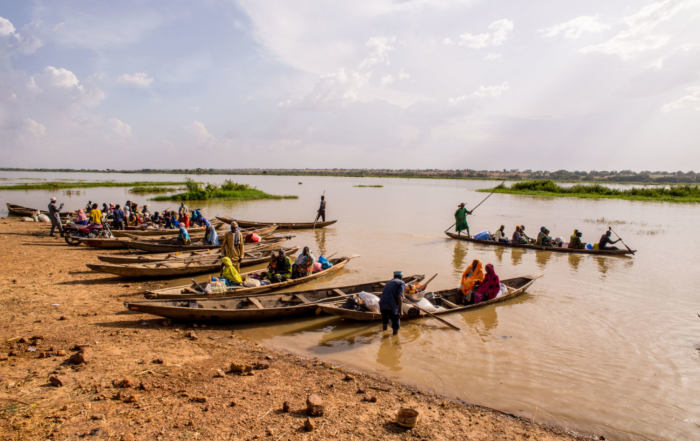EXHIBITION
photos
These photos illustrate the key findings of the study “Shoring up stability: Addressing Climate and Fragility Risk in the Lake Chad Region”. The pictures were taken by award-winning photographer and film maker Arno Trümper who accompanied the project team during their research in Niger, Nigeria and Chad between October 2018 and April 2019.
Climate-fragility risk: Climate and conflict dynamics undermine livelihoods
The Lake Chad region is caught in a conflict trap. The region used to be a vibrant trading hub. But years of conflict, poverty, weak governance and persistent human rights violations by both governments and insurgents have eroded social bonds among families, among generations, among ethnic groups, and between displaced people and host communities. People in the region face a double-headed problem: climate change is worsening the political and economic conditions that gave rise to the violence in the first place; and since 2009, conflict has prevented people from pursuing former livelihood activities and has undermined their adaptive capacity.
Climate-fragility risk: displacement
The Lake Chad region is hosting more than 2.4 million displaced people. In areas with high numbers of displaced people and refugees, relations have been tense, due to the perception that the refugee communities are benefiting more from incoming humanitarian aid than host communities.
While many humanitarian agencies provide food to camps for internally displaced persons and refugees, few provide the fuel needed to prepare food. This leaves the population with no other option than to cut wood for cooking. Displaced people are well aware of the negative consequences of deforestation on soil fertility and reduced protection from sand storms, but have few options for cooking food. In addition, collecting firewood poses a security challenge since people–mostly women and children–need to travel further from populated areas to find firewood. The longer distances put them at risk of attack, abduction, rape and killing.
Climate-fragility risk: Break-down of social cohesion
Climate impacts and conflict have eroded social cohesion which leaves people less able to cope with shocks. The violence has altered relations between families, generations and workers, for example, by heightening natural resource conflicts as land rights and resources access come under increased pressure due to the influx of displaced people, restricted access to land and climate change. Trust between the government and local communities has also diminished in some Lake Chad countries due to reported human rights violations by state security forces.
Climate-fragility risk: Natural resource conflicts
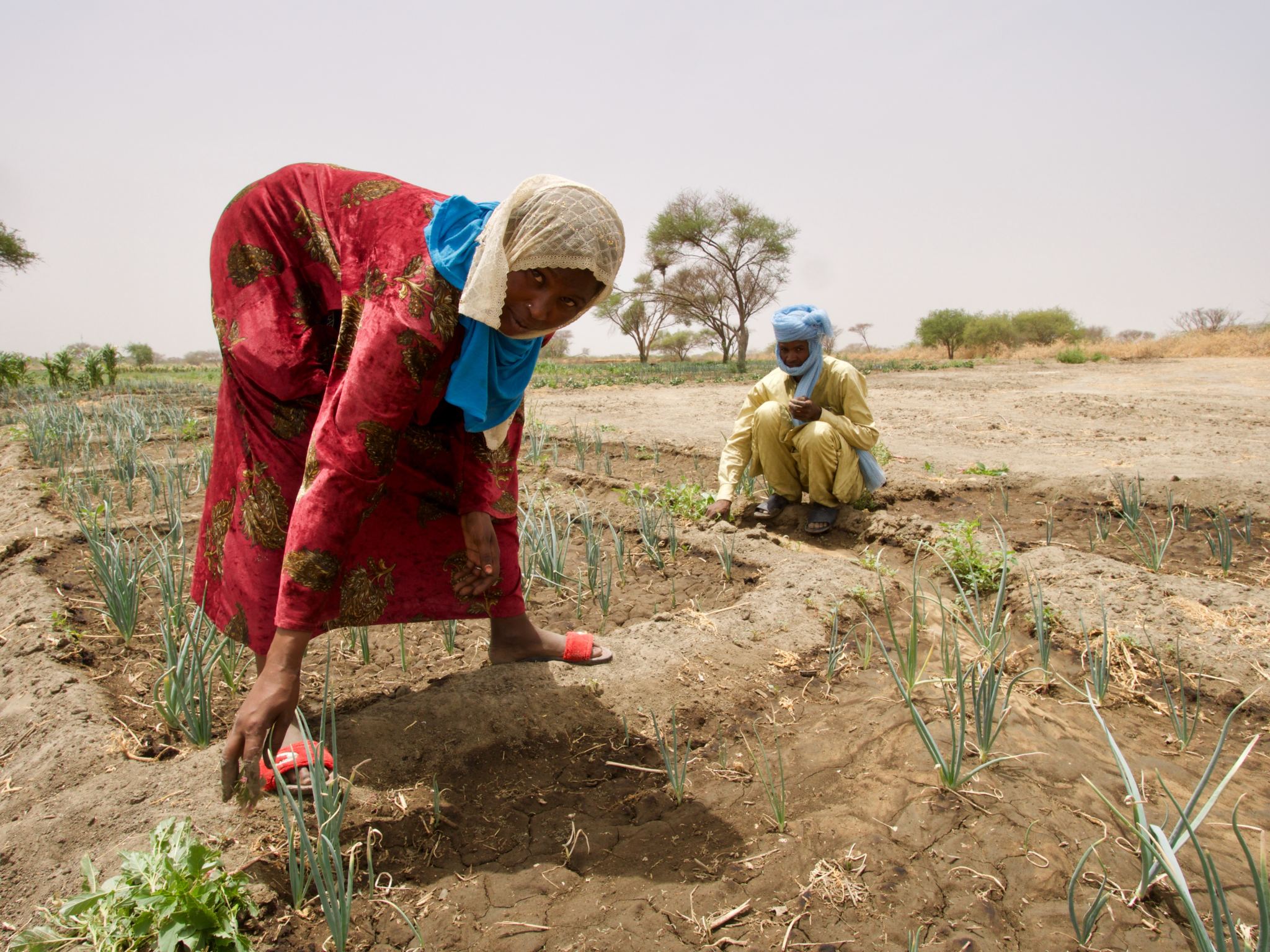
A woman checks her vegetable harvest near Bol, Chad (©Arno Trümper/adelphi)
Previously, disputes over natural resources like land and water were worked out at the interpersonal level, often facilitated by community leaders. But community governance mechanisms have stopped working during the conflict as community leaders may have become politicised, been killed, moved away, lost the trust of the community or have been overwhelmed by the numbers of people now living in the location.
Climate-fragility risk: Recruitment and retention into armed opposition groups
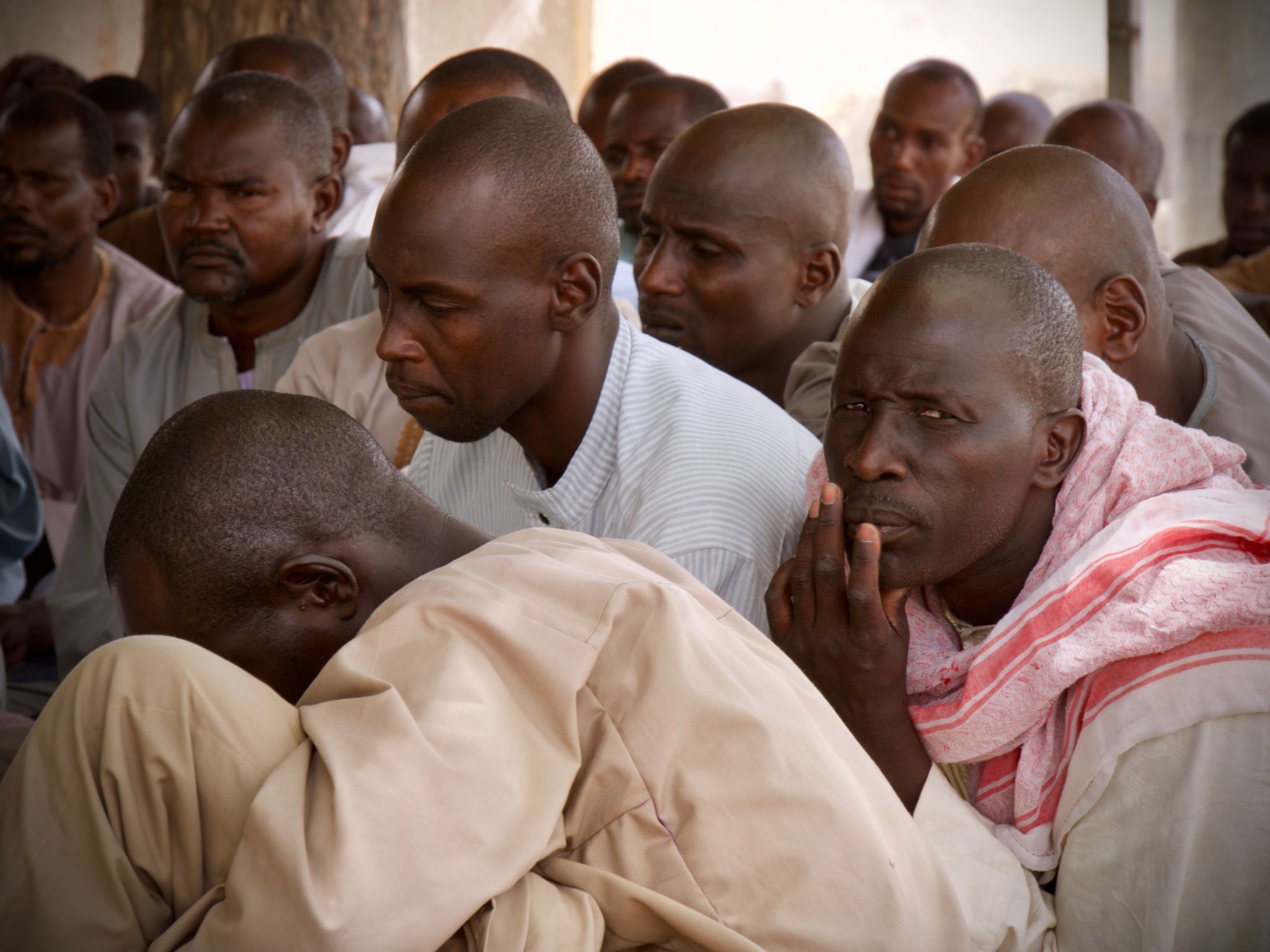
Men gather for a village meeting, near Bol, Chad (©Arno Trümper/adelphi)
Recruiters with armed opposition groups have been able to take advantage of the lack of social provision in all four Lake Chad countries. The groups fill a gap by offering services that are not provided by governments, such as religious education, healthcare, food and access to funds.
Some recruits leave armed opposition groups and then return, a trends that is growing, often due to much better economic opportunities available within armed groups compared with the lack of employment prospects outside. Recruits may see life in the forest as more dignified than living in a camp and depending on aid organisations for food.
Climate-fragility risk: Heavy-handed military responses
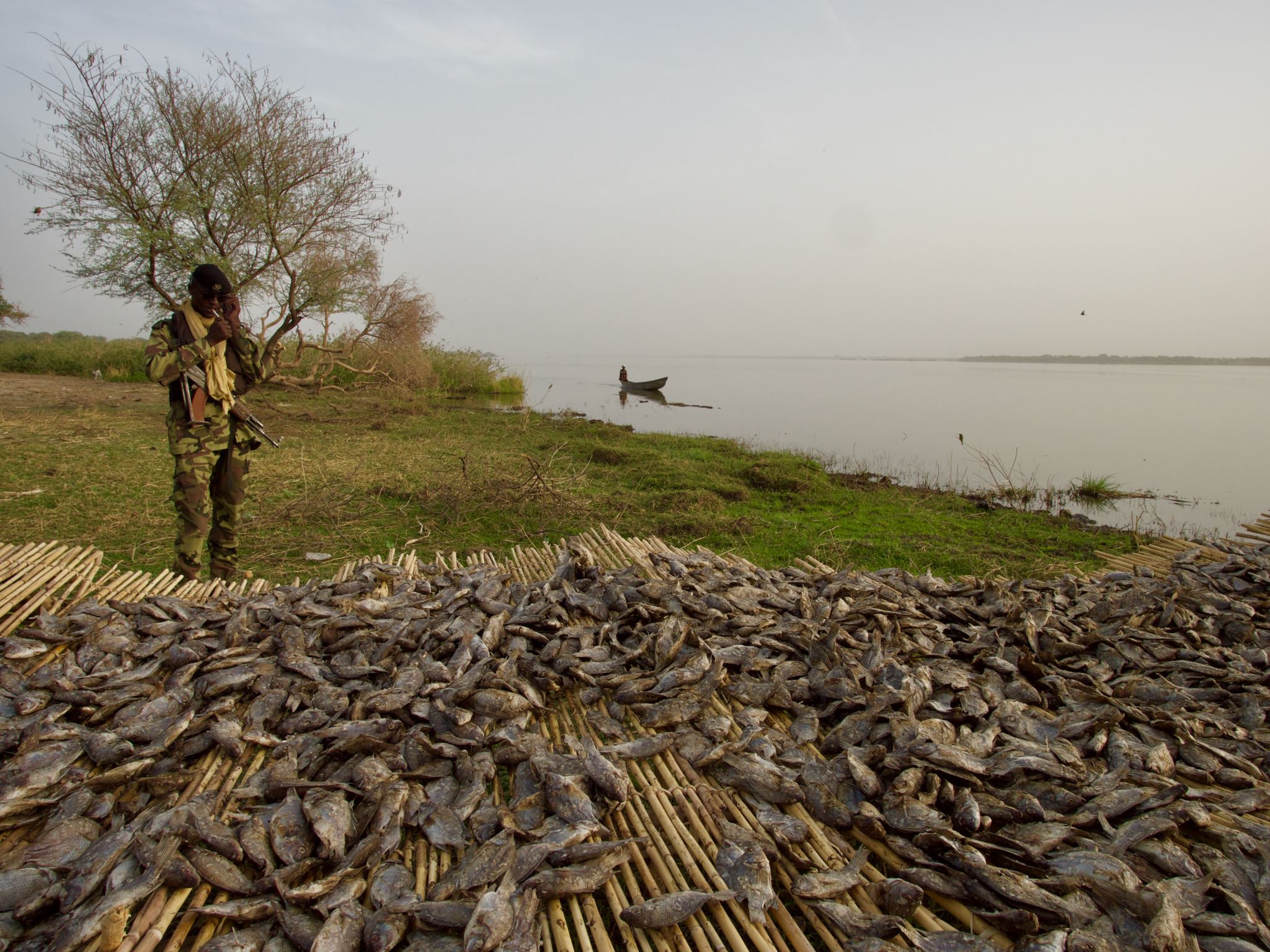
An armed security guard watches over fish drying by the lake in Baga Sola, Chad (©Arno Trümper/adelphi)
While military forces have had some success in bringing relative peace to the region, their heavily militarised approaches have often lacked sensitivity to the livelihoods and climate-coping strategies of local populations. For example, security forces have closed markets, blocked cross border trade and travel, banned livelihoods such as fishing in certain areas and restricted the movement of items such as fertilisers. These restrictions have heavily affected many people’s livelihoods as they can no longer move to new fertile areas to farm, herd or fish. In this way, key climate change adaptation strategies of mobility and livelihood diversification are no longer open to them.
1. Entry point: Building social cohesion
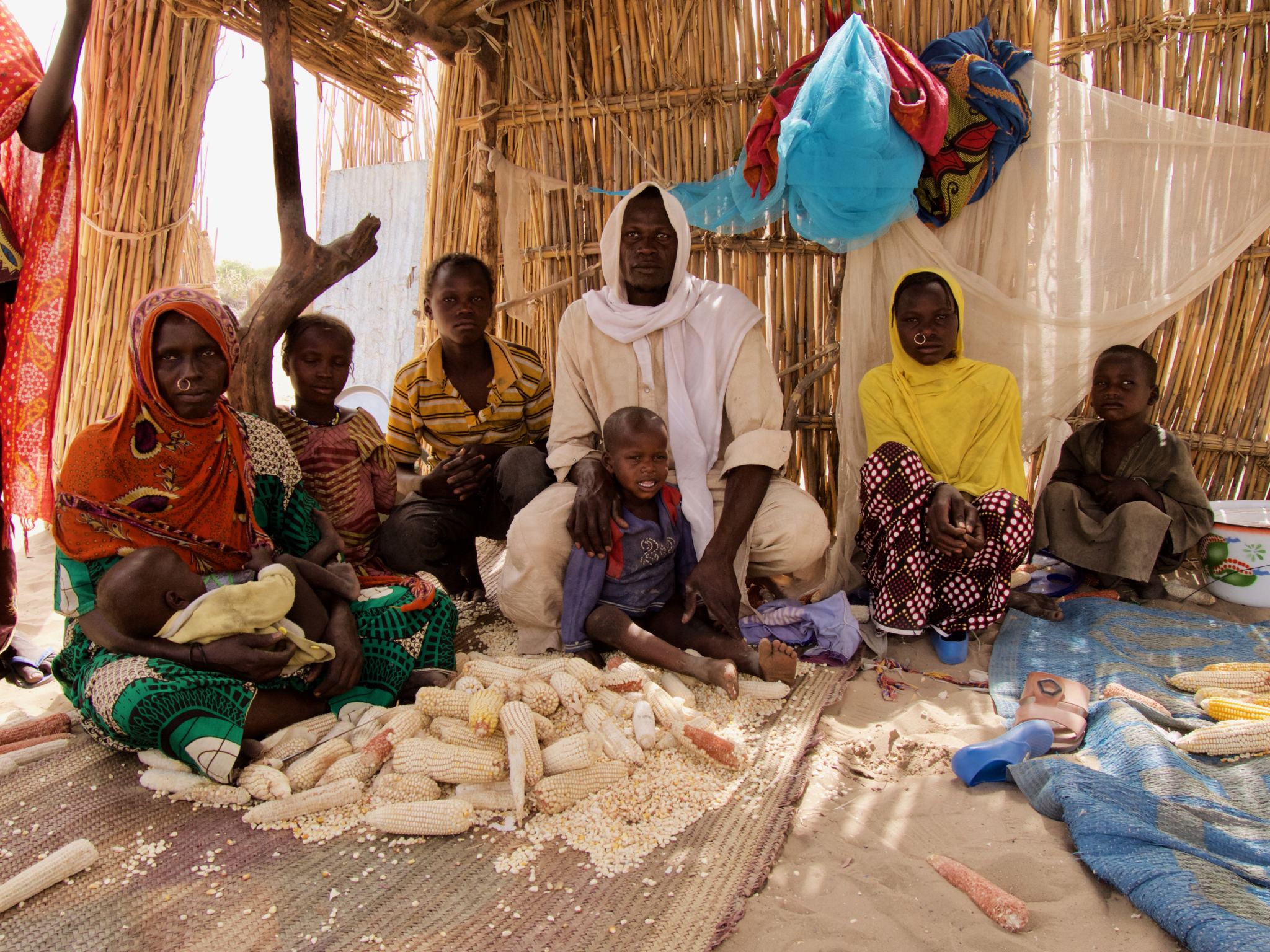
Women husking corn in an IDP camp in Baga Sola, Chad (©Arno Trümper/adelphi)
Social cohesion is a crucial part of building resilience in the Lake Chad region. This involves building up trust and relations among individuals, groups and communities such as IDPs, refugees and host communities. It also includes efforts that build the social contract between the state and the local population and activities that support institutional capacity among local and national governments. Ultimately, a people-centred crisis needs a people-centred response.
Specifically, this could entail processes to ensure access to justice and dialogue between people in IDP or refugee camps and host communities, between former fighters and other communities and across generations. Securing peoples’ right to land can directly contribute to peacebuilding and building social cohesion, but these policies need to be climate and conflict sensitive.
2. Entry point: Support resilient livelihoods
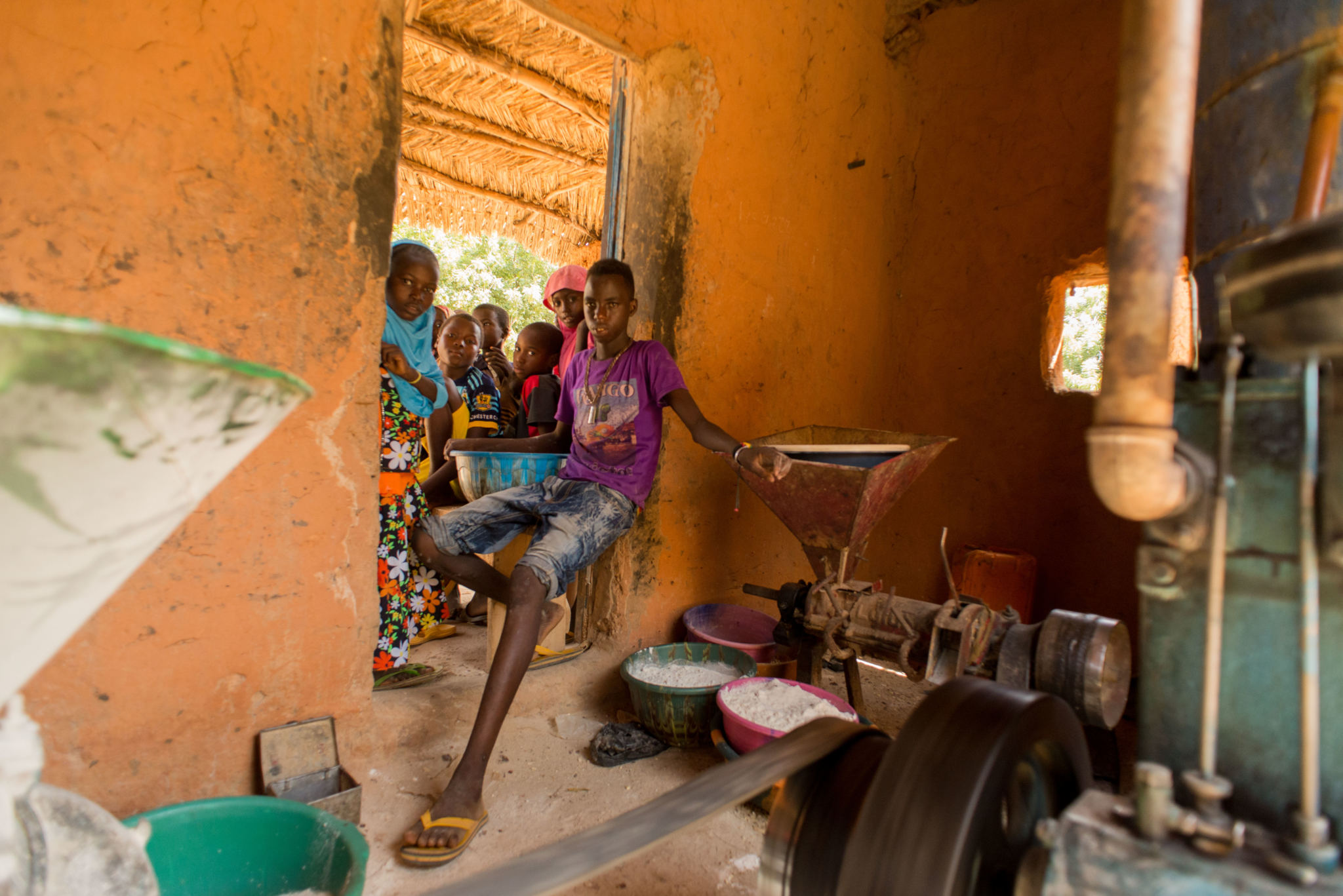
Children in a flour mill (©Arno Trümper/adelphi)
A lack of jobs and money is a major strain on resilience for the young, growing population in an area with endemic unemployment and underemployment. But it is also a risk as unemployed, marginalised and frustrated young people are highly susceptible to recruitment by armed opposition groups. For a generation more familiar with exclusion, where a sense of “otherness” has become entrenched, it is vital that efforts to restore livelihoods also foster a sense of ownership, inclusion and worth. The people’s ability to depend on unproductive pastoralism and agriculture has been undermined by degraded soil, weak value chains, inadequate physical and financial infrastructure, and poor entrepreneurial capacity. This makes climate-proof or non-agricultural livelihood options all the more important.
3. Entry point: Broaden access to and scope of services
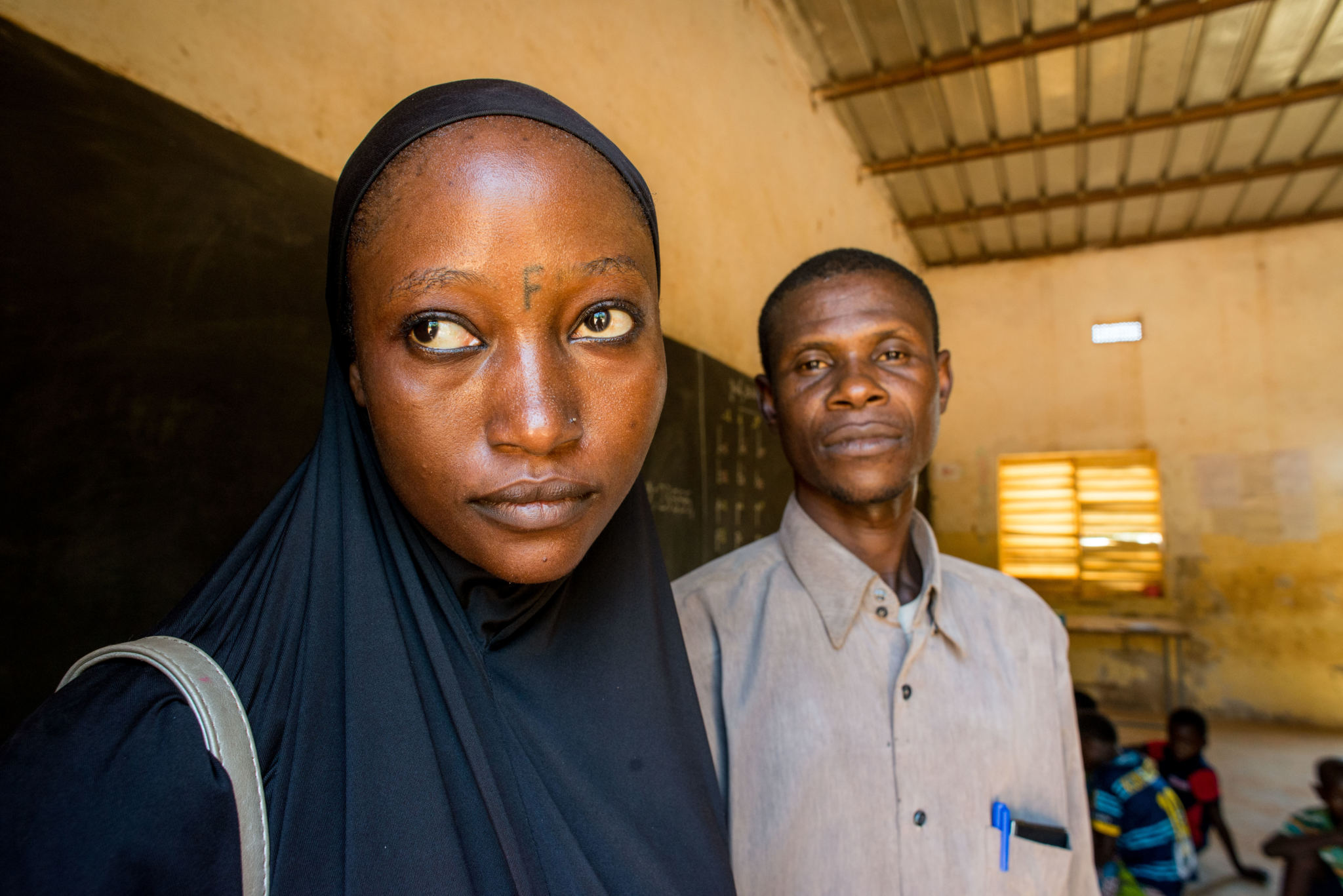
A teacher and headmaster during lunch break in a school in Niger’s Diffa Region. (©Arno Trümper/adelphi)
For many, life in humanitarian aid camps is their first experience receiving social services such as education, health, water, sanitation and energy. Access to social services is critical not just to break dependence on aid and help communities build their resilience to crises, but also to build a social contract between the state and citizens.
4. Entry point: Address gender inequality and human rights violations
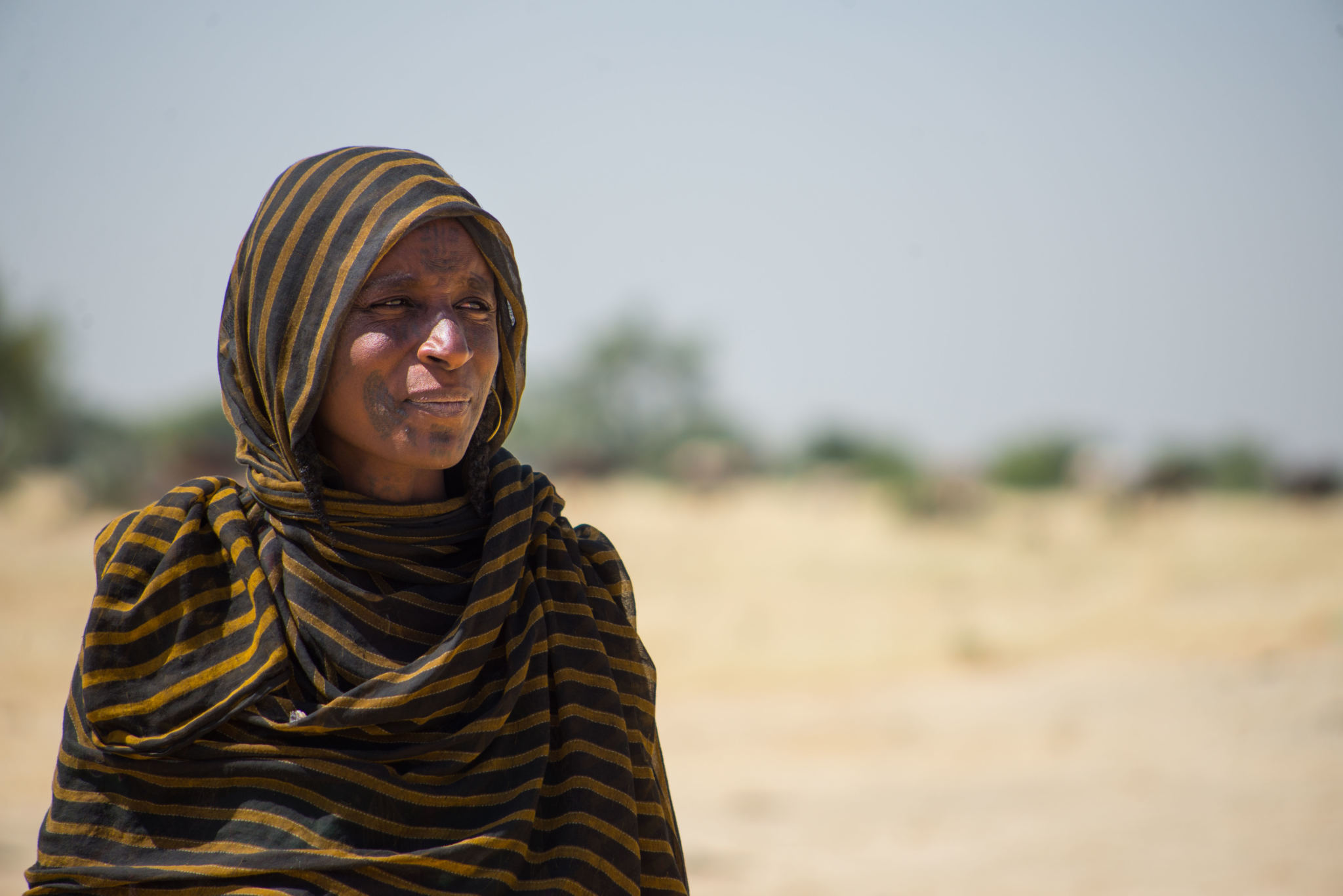
A pastoralist woman in Diffa, Niger. (©Arno Trümper/adelphi)
Gender inequality and human rights violations are a major challenge in the Lake Chad region. Women face particular difficulties obtaining the right to own land. Facilitating access for women to land and other productive assets should be an important element of development and peacebuilding.
The resources provided by the lake can help support women’s livelihoods. Women’s groups, for example, successfully process and market products made from spirulina, a form of nutritious algae commonly found in Lake Chad. Such activities have considerable scale-up potential.
5. Entry point: Climate change adaptation and improved natural resource management
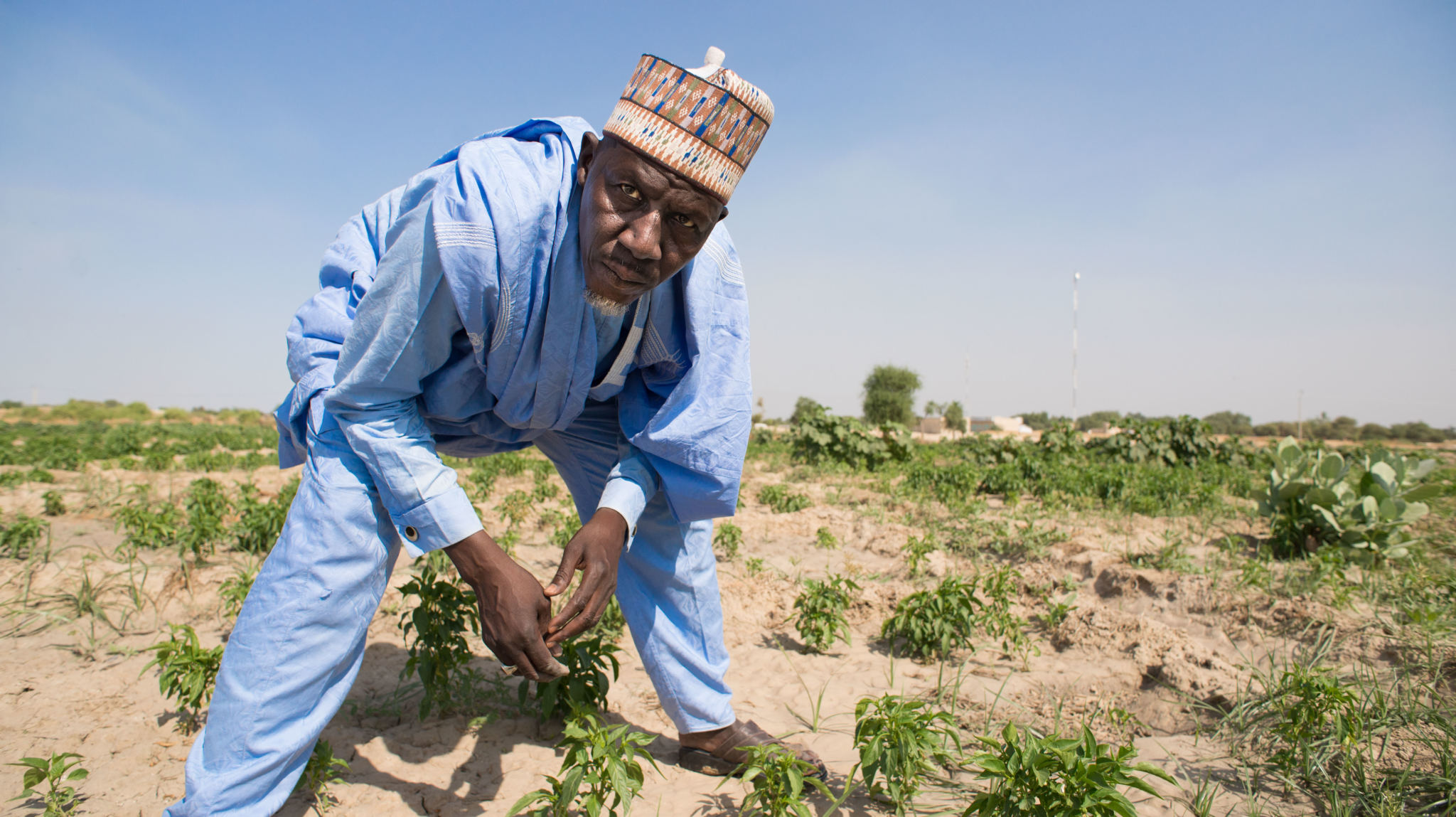
A man works in a chilli field close to Bosso in Niger’s Diffa Region. (©Arno Trümper/adelphi)
The growing risks of climate change can further entrench cycles of violence and hinder prospects of stability. Efforts to support climate change adaptation, enhance resilience to climate shocks and improve natural resource management can also be a vehicle for peacebuilding.
For example, the climate and security impacts of deforestation are already apparent through degraded soil, loss of shelter for livestock and longer journeys to unsafe areas women face when collecting firewood. Reforestation can increase climate resilience and can reduce tensions between communities.
6. Entry point: Information and communication technologies
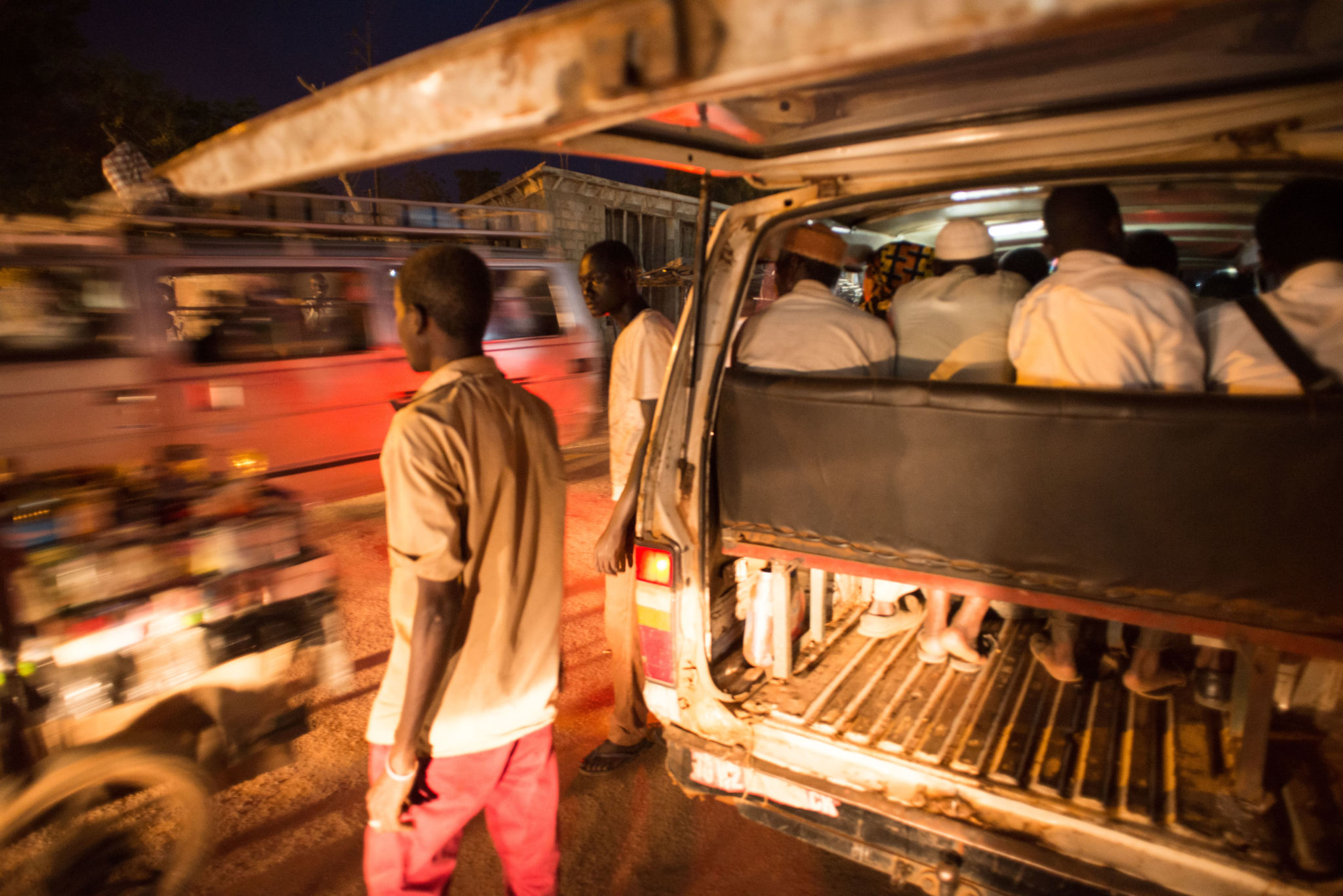
A taxi driver waits for clients at night in Niamey, Niger. (©Arno Trümper/adelphi)
Information and communication technologies (ICT) that support farmers, livestock herders and fisher folk with information on markets and prices can also support better early warning and preparedness against climate shocks, enabling economic empowerment and helping people determine their own futures.
For example, providing mobile phones could help people share weather information via SMS which can help farmers plant the right crop at the right time. However certain preconditions, such as network connectivity and ICT access for all levels of society, need to be ensured in order to harness the benefits and avoid creating new inequalities.
7. Entry point: Better climate and hydrological information
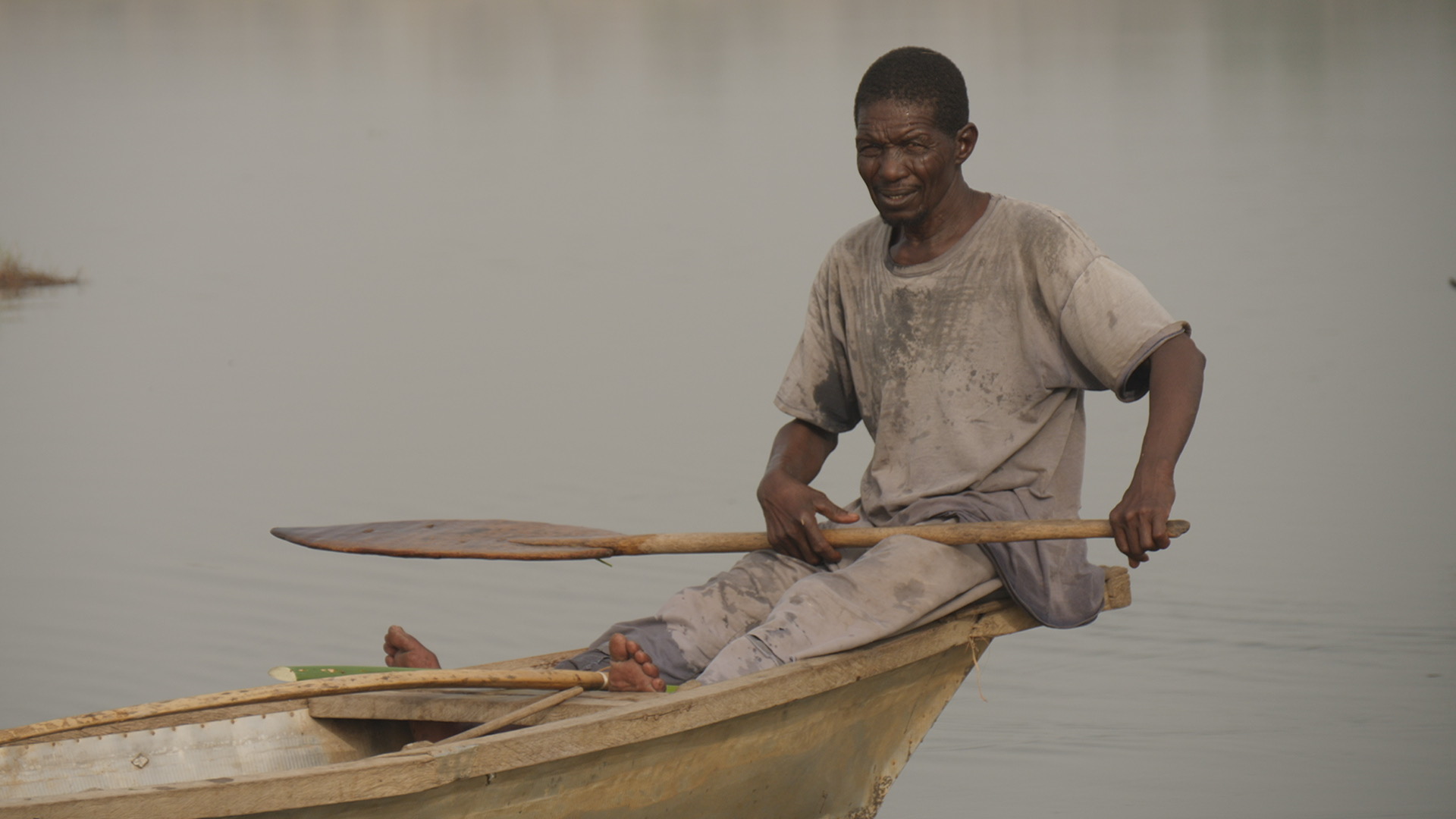
A fisherman on the lake at dawn, Baga Sola, Chad (©Arno Trümper/adelphi)
Access to accurate scientific data is critical to inform effective policy decisions. If done correctly, this can help build relationships between the people and the government.
Better information is not only relevant to policy makers, it can also be a major resilience booster for community members, especially those whose livelihoods depend on weather. Specific measures could include having radio stations disseminate forecasts to provide better information to the population and alert them to changes in the weather so that crops can be sown and harvested accordingly.
8. Entry point: Invest in governance and institutional development
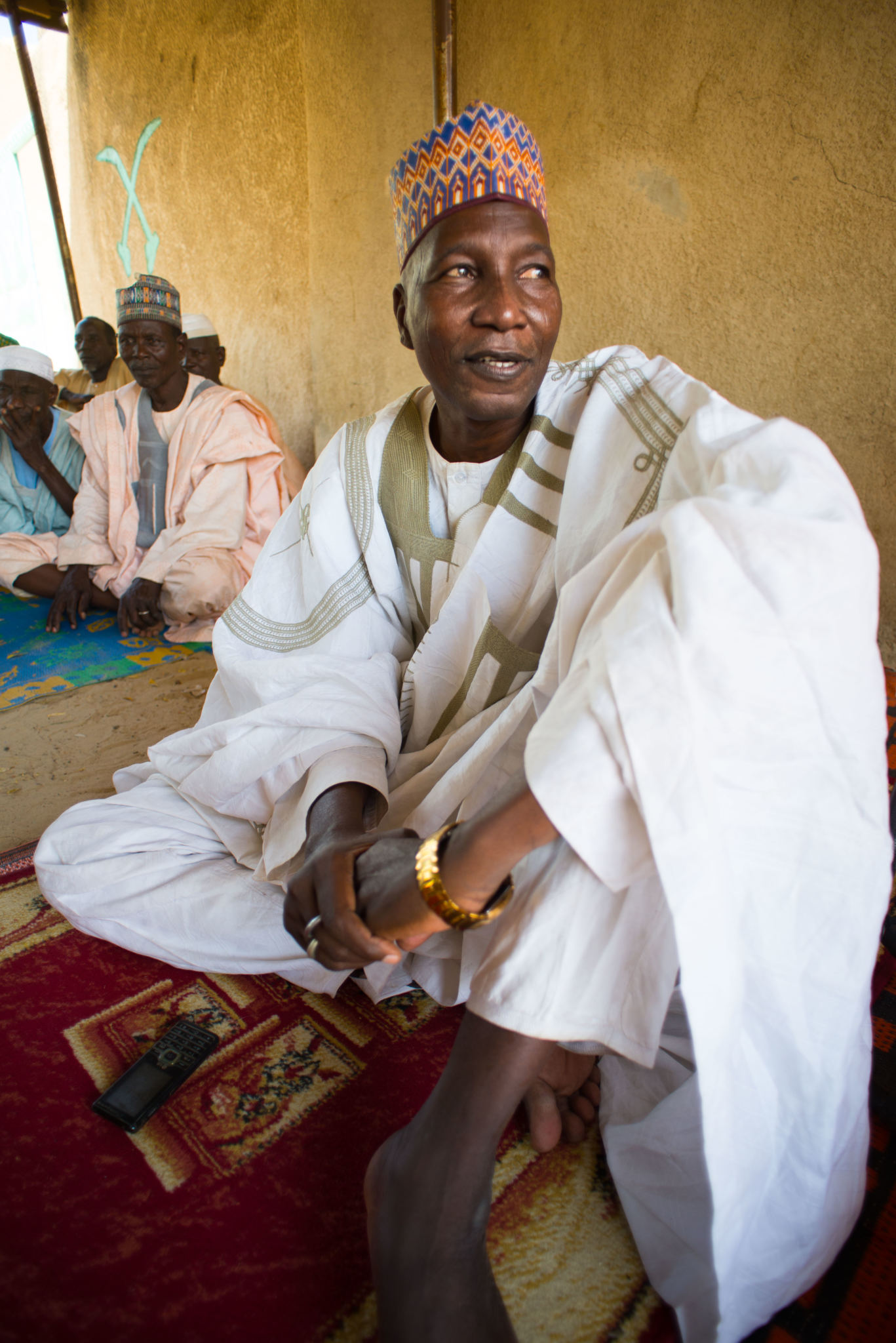
A community leader holds a meeting on how to cope with the restricted livelihoods of the population in Bosso, in Niger’s Diffa Region. (©Arno Trümper/adelphi)
Weak governance was a core driver of the conflict. Strengthening governance requires support to provide quality social service delivery, tackle corruption and invest in the expansion of governance at local levels. Institutional development provides opportunities to be climate sensitive. For example, local planning processes can be used to facilitate the resolution of tensions around land allocation for housing and agriculture or livestock production and to reflect changes in demographics. Building in climate assessments that integrate analysis of conflict, gender and social exclusion dynamics into planning processes can serve as an early warning system to areas most at risk from climate change.
9. Entry point: Critically review and adapt the tactics used to combat armed opposition groups
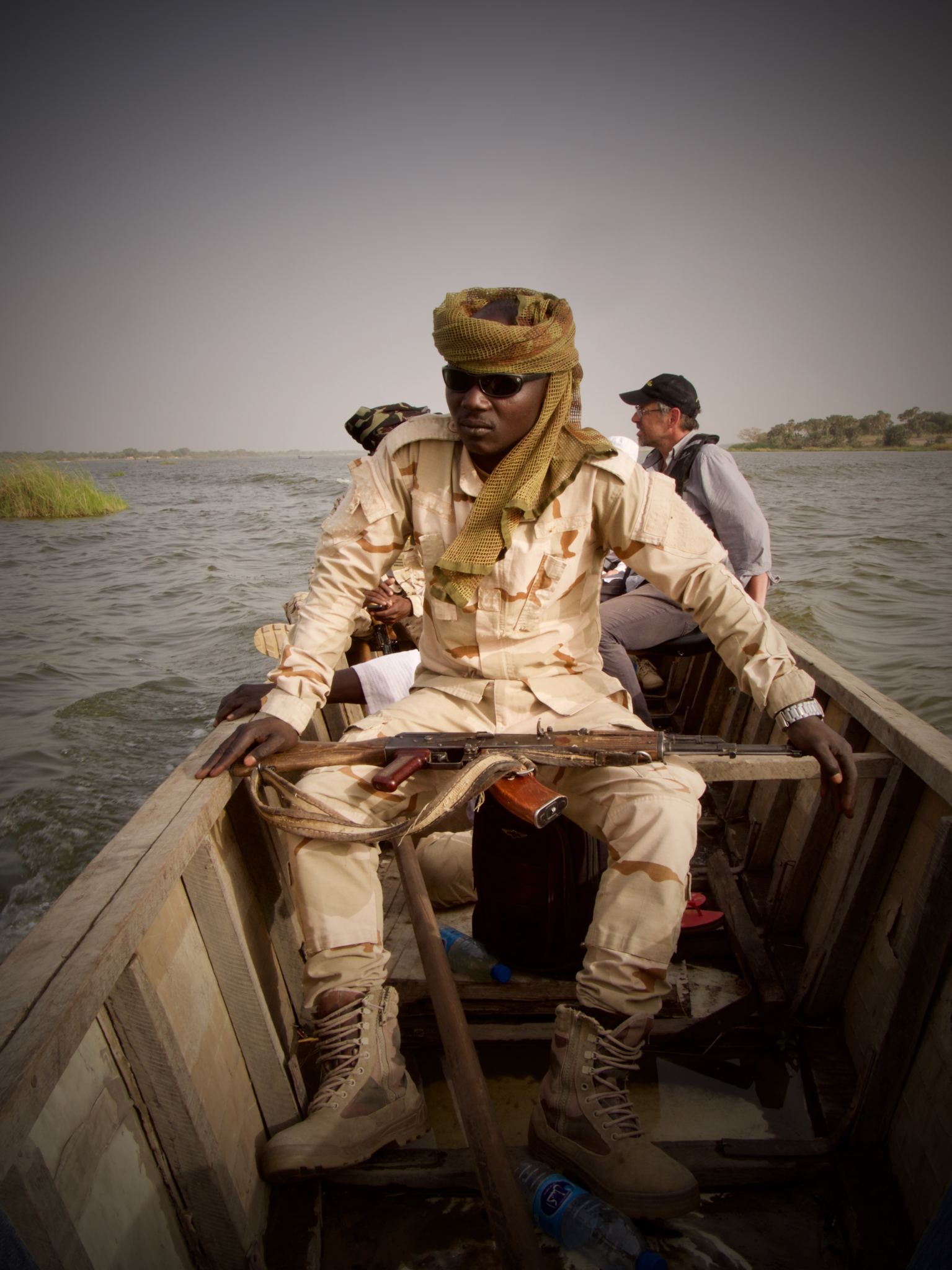
Armed security guards travel across the lake near Baga Sola, Chad (©Arno Trümper/adelphi)
Weak governance was a core driver of the conflict. Strengthening governance requires support to provide quality social service delivery, tackle corruption and invest in the expansion of governance at local levels. Institutional development provides opportunities to be climate sensitive. For example, local planning processes can be used to facilitate the resolution of tensions around land allocation for housing and agriculture or livestock production and to reflect changes in demographics. Building in climate assessments that integrate analysis of conflict, gender and social exclusion dynamics into planning processes can serve as an early warning system to areas most at risk from climate change.
Militarised responses have been a main tactic of governments in tackling the violence in the region so far. By and large, the result has been the continued failure to defeat armed opposition groups and achieve peace while communities around the Lake continue to suffer. A review of and shift in tactics by the various governments is required to understand how they can better combat armed opposition groups without further undermining social cohesion and livelihoods. This requires better efforts to win the ‘hearts and minds’ of affected communities through actions which promote, for example, better service provision, safe and equitable access to natural resources and access to justice.
10. Entry point: Climate-proof economic growth
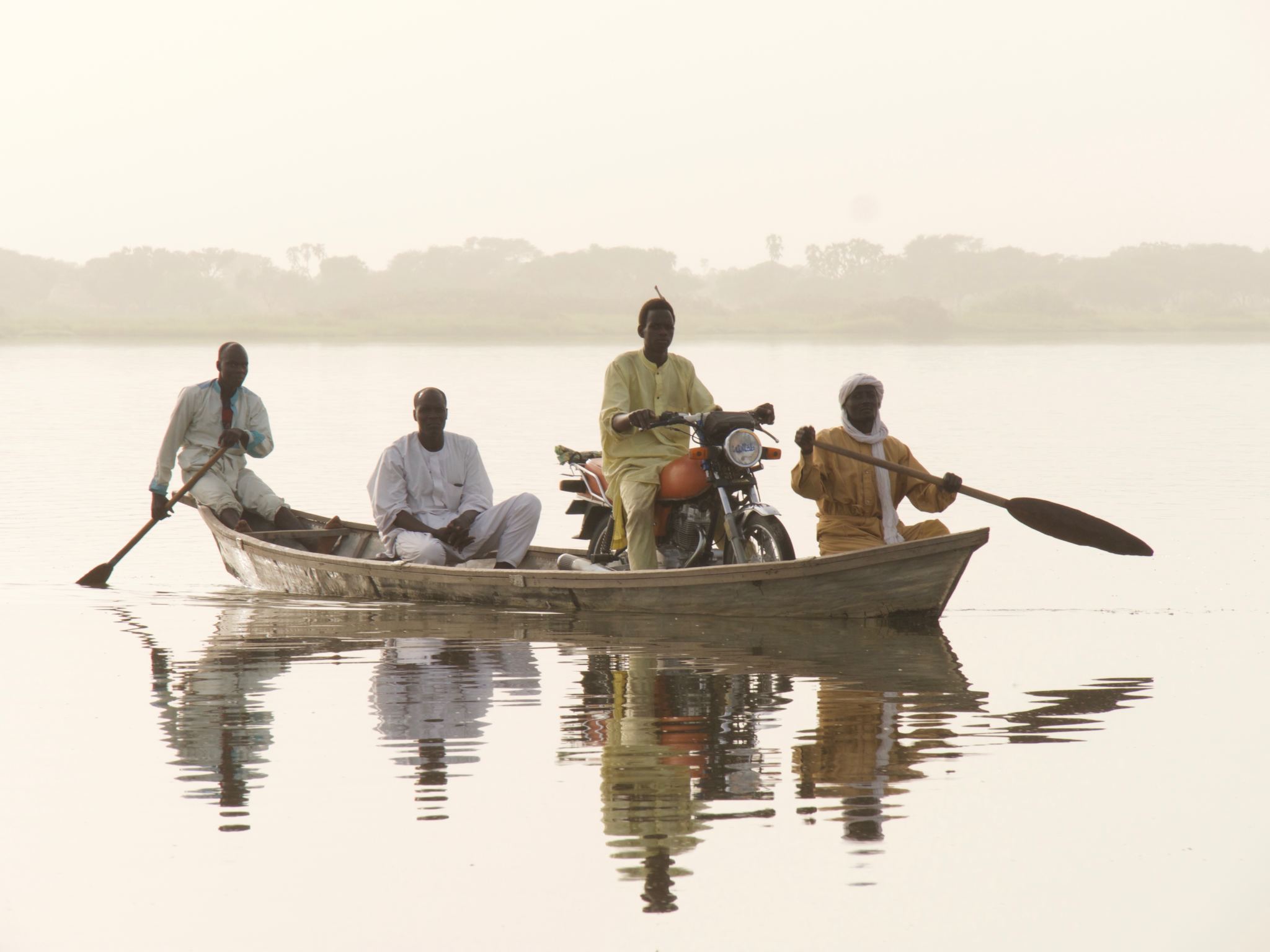
A boat taxi transports people and goods across the lake near Baga Sola, Chad (©Arno Trümper/adelphi)
Stability in the Lake Chad region depends on enabling and ”climate-proofing” growth. One way to do this is by promoting employment opportunities which are less susceptible to unpredictable weather trends and contribute to social cohesion by bringing together different ethnicities or occupational groups. For this, livelihoods planning needs to be based on high-quality climate data and conflict analysis that integrates gender and social exclusion analysis. It also requires restored markets and safe cross-border travel.
Towards a resilient Lake Chad
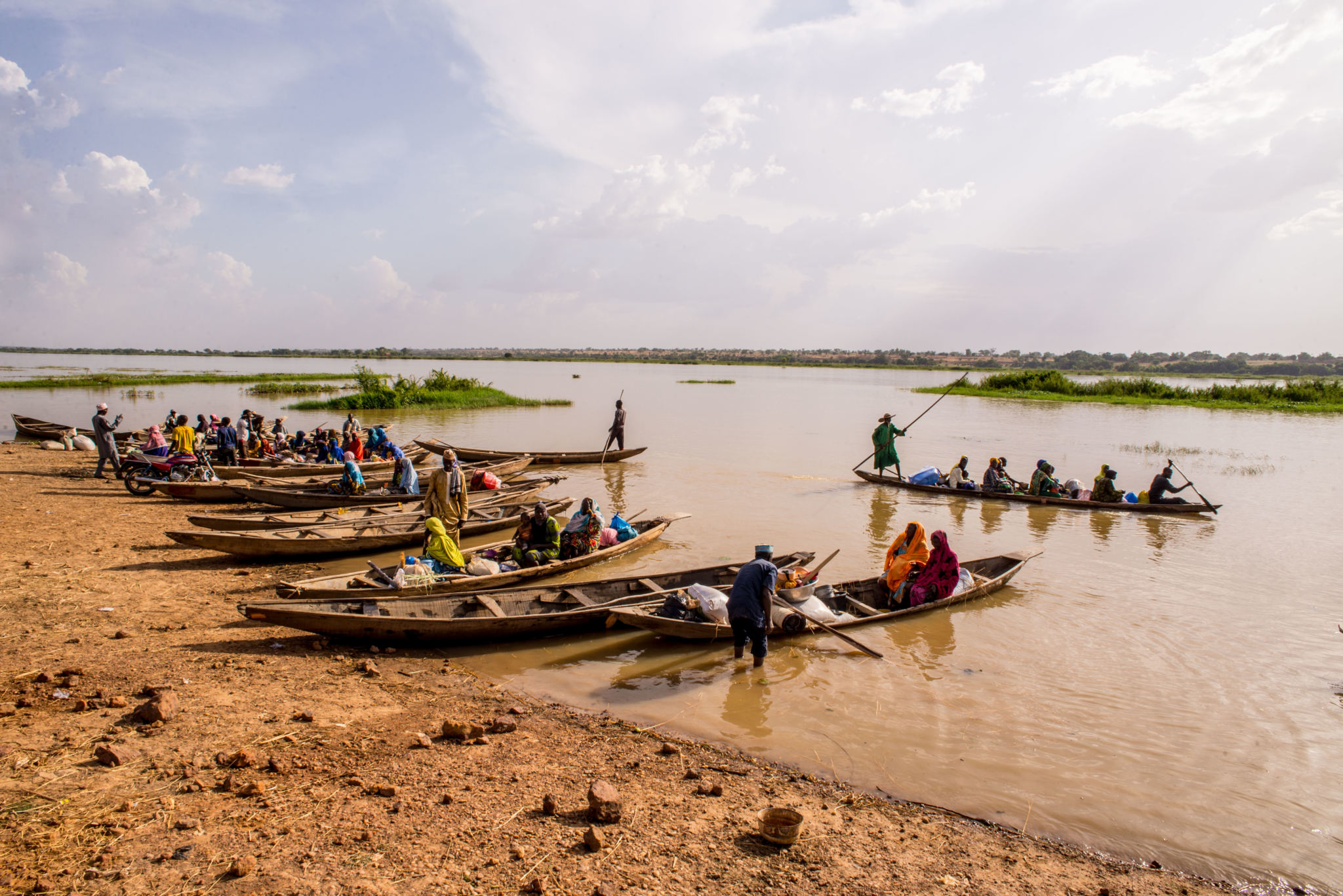
Men ferry people and goods on dugouts on Niger River near Niamey, Niger. (©Arno Trümper/adelphi)
Lake Chad used to be a thriving economic hub and the bread basket for the region, with people, goods and livestock freely moving across national borders and between the markets of four countries’ informal trading networks.
If peace is restored and the lake is carefully managed by the four countries that share it, the lake could once again be an engine for sustainable livelihoods and stability in the region, increasing food security and reducing poverty.

